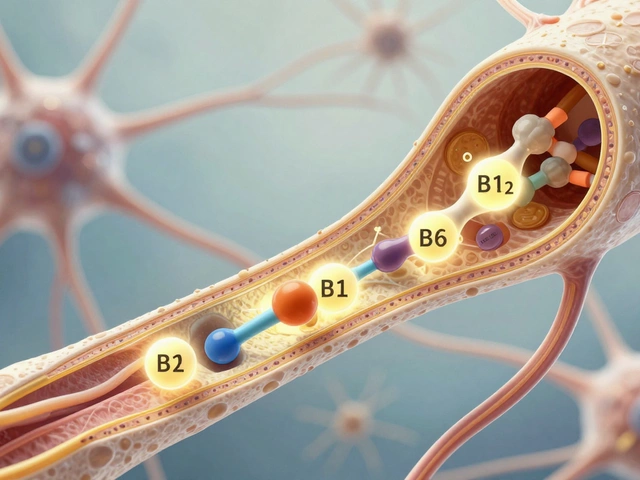Mental health isn't just a trending topic; it's a crucial part of our well-being. While a fair amount of awareness exists, understanding specifically disabling mental illnesses can help us navigate the challenges they bring. If you or someone you know is grappling with mental health issues, knowing the most incapacitating ones is a good start.
Here's the deal: when we talk about disabling mental disorders, we're referring to conditions that significantly impair a person's ability to perform daily activities. Whether it's holding down a job, maintaining relationships, or even just getting out of bed—these illnesses can be downright overwhelming.
Which ones top the list? Well, some might surprise you. It's not just about how intense they are, but also how they interfere with life. Knowing the symptoms and the impact on daily functioning can be a game-changer.
Stigma around mental health can make it tough for many to seek help or even talk about their struggles. But recognizing the specific challenges of these illnesses is the first step to coping, managing, and eventually thriving. Ahead, we'll dive into the big players in the world of mental health disabilities and talk about strategies that actually help.
Understanding Mental Illness and Its Impact
Mental illnesses are more common than many of us realize. In fact, one in four people worldwide will be affected by mental or neurological disorders at some point in their lives. Despite this high prevalence, there's a lot of misunderstanding about what these conditions entail and how they impact daily life.
At its core, a mental illness affects how we think, feel, and act. It can influence decision-making, reactions, and how we relate to others. Importantly, these conditions aren't just a phase or something a person can 'snap out of' by sheer willpower; they often require proper treatment and management.
Everyday Impact
For those living with mental disorders, even regular tasks can become daunting challenges. Imagine trying to get through a workday with severe anxiety making every interaction feel like an ordeal. Or picture how depression can make even simple activities like getting out of bed feel like climbing a mountain.
These illnesses don't just affect the individual; they ripple outwards, affecting families, workplaces, and the broader community. Addressing mental health is thus not just a personal issue but a societal one.
Breaking Down the Stigma
One of the biggest barriers people face is the stigma around mental health. Many still see it as a weakness rather than a genuine health concern. This stigma can prevent people from seeking the help they need, resulting in prolonged suffering.
Tackling this begins with open conversations and education, helping others to understand that mental illnesses are real, common, and treatable. Just as someone wouldn't hesitate to seek help for a physical ailment, seeking support for a mental health condition should be equally encouraged.
A Quick Look at the Numbers
To give you a sense of scale, here's a snapshot of how mental health issues stack up globally:
| Condition | Global Prevalence |
|---|---|
| Anxiety Disorders | Approximately 264 million people |
| Depression | Over 280 million people |
| Bipolar Disorder | About 45 million people |
These figures remind us of the widespread nature of mental health issues and underline the necessity of understanding and support.
Understanding the impact of mental illnesses not only helps those directly affected but also fosters a more inclusive, compassionate society. Awareness can lead to better resources, improved therapies, and maybe even a reduction in those daunting numbers we see today.
The Top 10 List
There's a lot to unpack when talking about the most disabling mental illnesses. Each of these isn't just a list item but a reality for so many struggling out there. Let's break down what makes these conditions particularly challenging.
1. Major Depressive Disorder
This one's a heavyweight. The deep, persistent sadness and loss of interest can zap the joy out of life and keep you from your daily grind.
2. Anxiety Disorders
Anxiety isn't just feeling stressed. These disorders create intense fear and worry, often making simple tasks feel like climbing a mountain.
3. Bipolar Disorder
Extreme mood swings define this one. From manic highs to depressive lows, it can be tough to find balance in day-to-day living.
4. Schizophrenia
This isn't just about seeing things. It disrupts how you think, feel, and behave, breaking connections with reality and others.
5. Obsessive-Compulsive Disorder (OCD)
Obsessions and compulsions can take over your mind and life. It's more than just needing to clean or organize.
6. Post-Traumatic Stress Disorder (PTSD)
Linked to past trauma, PTSD manifests through flashbacks and severe anxiety, altering how you interact with the world.
7. Borderline Personality Disorder
Intense emotions, unstable relationships, and identity issues make living with this disorder very tough.
8. Eating Disorders
Anorexia, bulimia, and binge eating affect physical health deeply and have significant mental impacts too.
9. Autism Spectrum Disorder
Autism affects social interaction and behavior, presenting unique challenges and strengths for each individual.
10. Attention Deficit Hyperactivity Disorder (ADHD)
It's not just about losing focus. ADHD can disrupt learning, working, and relationships, especially without support.
Seeing these conditions laid out can be eye-opening. They remind us of the importance of understanding and compassion for those dealing with mental health issues.

Coping Strategies
Facing mental illnesses can be overwhelming, but having the right strategies at your disposal can make a big difference. It’s not just about treating the illness; it’s also about managing daily life in a way that feels doable and hopeful.
Build a Support System
First things first, don’t underestimate the power of a good support network. Whether it’s friends, family, or support groups, having people who 'get it' makes all the difference. They can offer not just emotional backup but practical help too. Remember, asking for help isn’t a sign of weakness, it’s a smart move in managing mental health.
Routine is Your Friend
Routine might sound boring, but it’s actually a lifesaver for those dealing with mental disorders. Having a structured day helps manage symptoms by giving your brain less to worry about. Whether it’s waking up, eating meals, or winding down at the same time each day, consistency helps keep chaos at bay.
Mindfulness and Relaxation Techniques
Mindfulness isn’t just trendy; it's scientifically backed. Techniques like meditation, deep-breathing exercises, or yoga teach you to focus on the present moment and can reduce stress. It’s about training your brain to notice thoughts without overreacting, and it’s a powerful tool against the challenges of mental illness.
Professional Help: Therapy and Medication
When it comes to professional help, therapy can be a game-changer. Cognitive-behavioral therapy (CBT) and other forms are effective for many mental disorders. And let’s not forget medication; under a doctor's guidance, it can balance brain chemistry and make symptoms more manageable. Don’t shy away from seeking expert advice; they’re there to help.
Track Your Symptoms
Keeping a symptom diary might seem tedious, but it provides insight into what worsens or eases your condition. Patterns will appear, helping you and your healthcare provider make informed decisions. Whether it's noting mood shifts, sleep patterns, or diet changes, this little habit can bring big benefits.
Exercise Regularly
Exercise is like a miracle drug with zero downsides. It boosts mood, reduces anxiety, and even helps with sleep. Whether it’s a full workout or a walk in the park, getting your body moving is a fantastic way to support your mental health.
Support and Resources
When it comes to tackling mental health hurdles, having the right support and resources can make all the difference. Whether you're directly affected or know someone who is, tapping into available tools can ease the journey.
Reaching Out for Professional Help
First things first, don't shy away from professional guidance. Therapists, counselors, and psychiatrists are trained to understand the layered complexities of mental disorders. Therapy sessions can provide strategies for managing symptoms and help you feel less alone in your struggle.
Consider seeking out a mental health professional who specializes in your specific condition. Remember, finding the right fit might take a few tries—kind of like dating, but with a little more paperwork!
Peer Support Groups
Peer groups can be a game-changer. These communities offer a safe space to share experiences and learn from others. You'll find groups specific to different mental illnesses, where members offer encouragement and advice based on their own journeys. Platforms like Meetup often list local support groups, while online forums provide a global reach.
Online Resources and Hotlines
There's no shortage of online resources, from educational websites to forums where you can ask questions or just vent. Organizations like the National Alliance on Mental Illness (NAMI) and Mental Health America offer tools, guidebooks, and crisis hotlines. Bookmarking these sites is a good idea for those unexpected rough days.
Practical Self-care Tips
- Consistency is Key: Establish a routine, even if it's just waking up and going to bed at the same time. Routines can provide a sense of normalcy.
- Mind Your Lifestyle: Regular exercise, nutritious meals, and adequate sleep play a significant role in mental health.
- Stay Connected: Even a quick chat with a friend can lift your mood significantly.
Support and resources are your wings if your current state is bringing you down. Lean on them, use them wisely, and remember you're not alone in this.








